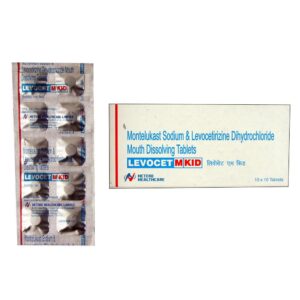MONTELUKAST + LEVOCETRIZINE
Montelukast: Montelukast, marketed under the brand name Singulair, is a medication used to treat asthma, hay fever, and allergic rhinitis. It is classified as a leukotriene receptor antagonist, which means it works by blocking the action of leukotrienes in the body. Leukotrienes are substances released during an allergic response that cause inflammation, bronchoconstriction, and mucus production.
Montelukast is usually prescribed for long-term asthma management, particularly in individuals who are not adequately controlled with other medications such as inhaled corticosteroids. It can also be used for the prevention of exercise-induced bronchoconstriction.
The recommended dose of montelukast varies depending on the age of the patient and the indication for use. For asthma, the typical dose is 10 mg once daily for adults and children 15 years of age and older, while children aged 6 to 14 years are usually prescribed 5 mg once daily. For seasonal allergic rhinitis, the usual dose is 10 mg once daily for adults and children 15 years and older, whereas children aged 2 to 14 years are prescribed 5 mg once daily.
Montelukast is generally well tolerated, but like any medication, it may cause side effects. Common side effects include headache, gastrointestinal symptoms (such as nausea, diarrhea, and abdominal pain), dizziness, and fatigue. Less frequently, patients may experience hypersensitivity reactions, such as rash or swelling of the face, lips, tongue, or throat. Serious neuropsychiatric events, including agitation, depression, suicidal thoughts, and hallucinations, have been reported in some patients taking montelukast, though these side effects are rare.
It is important to note that montelukast should not be used for the treatment of acute asthma attacks. In such situations, a short-acting bronchodilator should be used instead.
Levocetrizine: Levocetirizine is an antihistamine drug used to alleviate allergy symptoms such as sneezing, runny nose, itchy and watery eyes, and itching of the nose or throat. It is commonly used to treat allergic conditions like hay fever (allergic rhinitis) and hives (urticaria).
The mechanism of action of levocetirizine involves blocking the histamine H1 receptors. Histamine is a chemical that is released by the body during an allergic reaction, causing allergy symptoms. By blocking these receptors, levocetirizine prevents the action of histamine and helps relieve allergy symptoms.
The usual dose of levocetirizine for adults and children 12 years of age and older is 5 to 10 milligrams (mg) once daily. For children 6 to 11 years of age, the recommended dose is 5 mg once daily. Levocetirizine is available as tablets, oral solution, and as a chewable tablet for children.
Common side effects of levocetirizine include drowsiness, fatigue, dry mouth, headache, and an upset stomach. These side effects are usually mild and transient. However, some people may experience more serious side effects such as dizziness, difficulty concentrating, and allergic reactions. It is important to consult a healthcare professional if any unusual or severe side effects occur.
Levocetirizine may interact with other medications, so it is essential to inform your healthcare provider about any other drugs you are taking. It is also important to follow the recommended dose and not exceed the prescribed amount without medical supervision.
Levocetirizine is a widely used antihistamine that provides effective relief from allergy symptoms. However, as with any medication, it is advisable to consult a healthcare professional before starting treatment to ensure it is appropriate for your individual needs and medical history.

